#elfhild
Text
I've been drawing just, so many dudes, so here are some Ladies of Gondor and Shieldmaidens of Rohan! Sometimes you just have to design a bunch of ren-faire gowns and accessories, you know?
First, Eowyn, the best excuse to draw split skirts. Her star-embroidered gloves were a gift from Faramir, but it wasn't until I drew Finduilas below that I realized her pendant was probably also a gift from him as well.
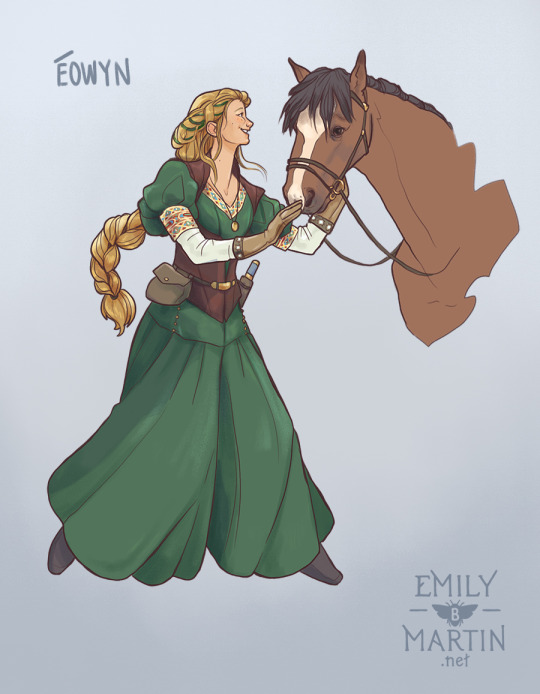
Lothiriel! I referenced her pose from my fave, @adorkastock. I don't have many headcanons about Lothiriel but I imagine she's the only person who can make Eomer trip over his own feet.
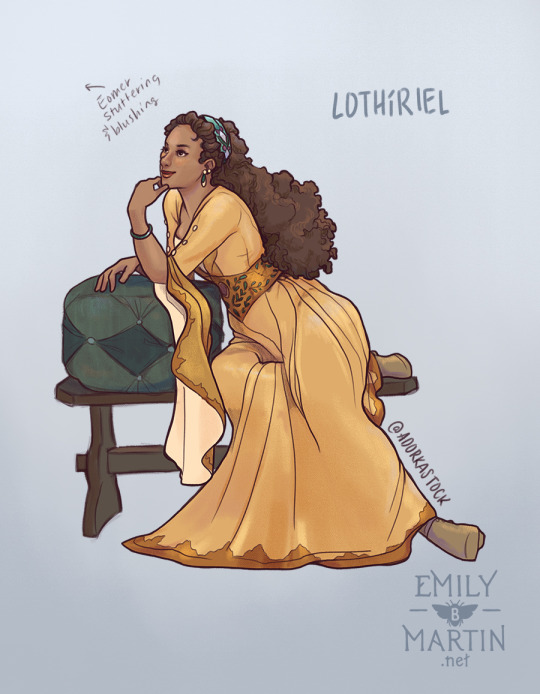
Theodwyn, Eowyn and Eomer's mother! Maybe she was born with a clubbed foot. We don't know. Tolkien only tells us she was pretty. A big thank-you to @hurricanek8art, @fruitbatvampiresociety, and @arrowpunk for giving me great feedback on her cane, including wrapping the base in leather and adding a skirt hike to her belt to keep her hem up.

Elfhild, Theoden's wife and Theodred's mother! No big headcanons here, either, but I think she'd bring Theoden a lot of joy and purpose and thus a lot of grief and aimlessness when she died.
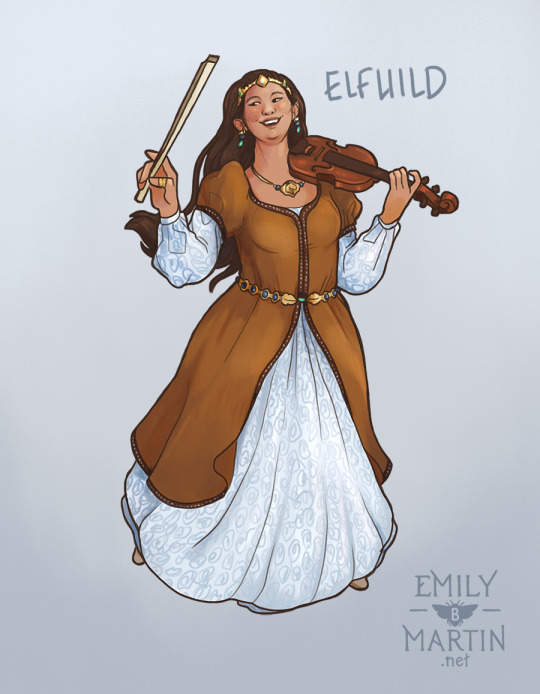
And finally, Finduilas. There's the pendant Faramir gave Eowyn, and oh, her cape clasp looks familiar.
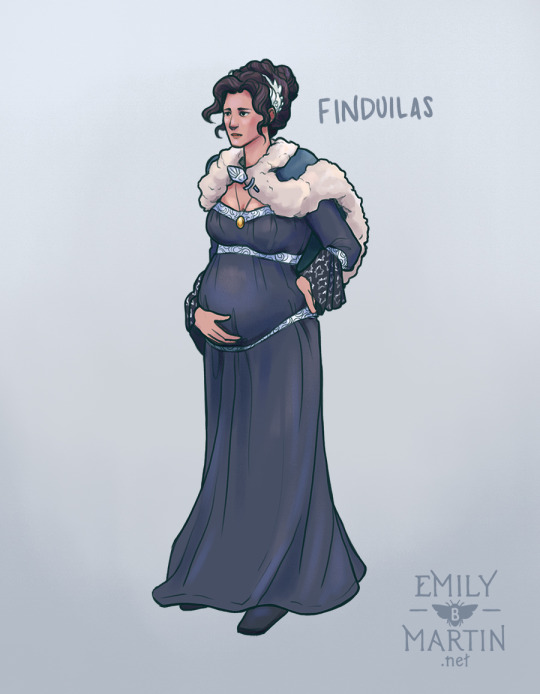
Tolkien gives us a few extra sentences about Finduilas, and so we know she had a difficult time in Minas Tirith. He writes that she was gentle and beautiful, but that "she withered in the guarded city... the shadow in the east filled her with horror, and she turned her eyes ever south to the sea that she missed." He also says Denethor "loved her, in his fashion," which I read as, "guy couldn't healthily express an emotion if it was written out for him." I imagine Finduilas was lonely and isolated, and, in pregnancy, afraid of the world she was bringing her babies into.
But maybe things weren't all bad! Maybe before she got too ill, she brought her boys to the seashore, where Faramir would babble and splash and Boromir would run all over creation and bring her treasures.
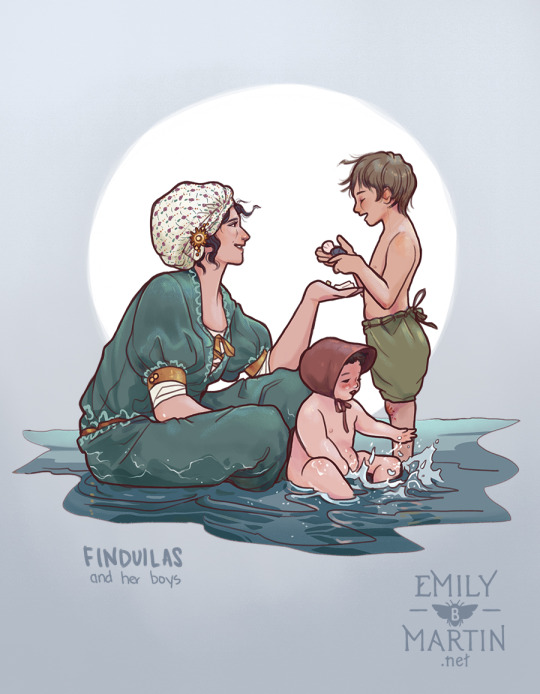
#lord of the rings#lotr#women of lord of the rings#fantasy fashion#gondor#rohan#eowyn#lothiriel#theodwyn#elfhild#finduilas#boromir#faramir
3K notes
·
View notes
Text
Someone asked me lately about Elfhild, Théodred's mom, and I'm procrastinating from other things so I wrote a ficlet (600ish words) about her. The summary of my Elfhild HC is that she was a musician/maker of instruments who was chosen to marry Théoden. They did eventually fall in love, and she was thrilled to be pregnant. But toward the end of her pregnancy, she was given some foresight into her impending death in childbirth. So I wrote this about how things went for her after she had that premonition, which she didn’t share with anyone else. Anywho. Here it is, the impulsive product of procrastination from other things!
***************
Elfhild thought first to tell her son all the most important things he would need to know about his life. That duty would always have to come first, but he should take care to find a refuge from the burdens of that duty. That history and tradition were valuable, but he needn’t be afraid of trusting his own instincts. That he would face many challenges, but if he treated others with kindness, he would have many allies to help him. She rushed through her lessons, determined to give him all the wisdom she had about how to make his way in this world that he wasn’t yet part of.
As time grew short, she decided many of the most important lessons were ones he would need to learn on his own, and so she began to tell him instead about herself, sharing things he might not ever hear otherwise. The words to songs that she had written just for him. How gazing at the stars and picking out shapes and figures in the night sky brought her peace and calm after difficult days. That she was proud to have a skilled trade that could have supported her in comfort even if she hadn’t simply been passed from one noble family to another. That although she loved his father deeply and would choose Théoden now without hesitation, she still wished she had been given the choice back when it mattered most.
The end came ever nearer, but she always had more yet to say. Even as she struggled with aching joints and sleepless nights and painfully stretched skin and a constant burning in her chest, she begged him to stay with her for just a little longer. To let her endure the discomfort so that she could finish telling him all the things she needed him to understand. That she was infinitely grateful for the months they had shared. That she loved him above all else. That she wouldn’t regret giving her life for his. That none of this was his fault. Even if he could never remember what she said, she hoped that he would somehow still know in his heart that she had said it. And so she kept talking, resting a hand gently where she guessed his head to be and praying that the sound of her voice would reach his little ears. She talked to him until she no longer had breath to form her words or fill her lungs or keep her life.
It was nearly forty-two long years before she would be able to speak to him again, and still she regretted that it was so soon. She wanted more for him, and the news that he was expected shortly brought her joy and sadness in equal measure.
She took up an anxious watch, uncertain how to recognize someone who had spent his entire existence beyond her view. Someone whose history and fate were yet a mystery to her. Someone who would now be a man, tall and strong and proud and so different from the glistening infant she had barely glimpsed through the haze of her final seconds of life. But when he came at last, she knew him in an instant by the easing of her heart. The feeling of wholeness again. And when she called his name and he turned in her direction, she saw the light of recognition in his eyes, too. I know your voice, he said. Somehow I’ve always known it.
The sound of his own voice was deep and warm and so much like his father’s, and she wept to hear it for the very first time. And then she sat by his side, this beloved stranger who had once been a part of her, and she held his hand and smiled and listened while he told his mother all the most important things she would need to know about his life.
***************
So those are my Elfhild thoughts. If you've read my Théodred stories, you’ll see that huge parts of his character directly reflect the stuff Elfhild expresses to him here (in some cases, he literally echoes her almost word for word) because he really did hear her, even if he never could have articulated it as such.
#lotr#lord of the rings#elfhild#théodred#theodred#head canons of rohan#filling in some of tolkien's dead women
19 notes
·
View notes
Text

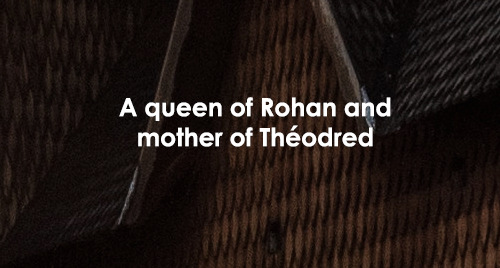
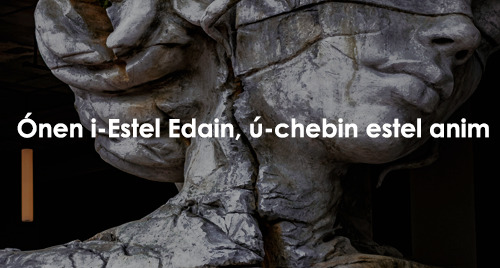
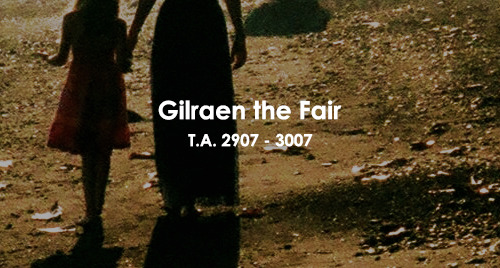

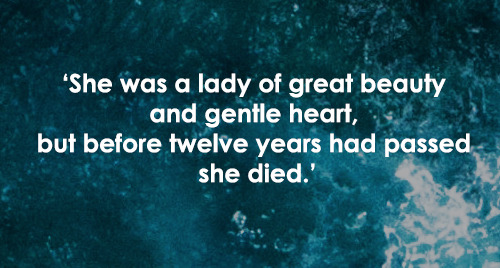
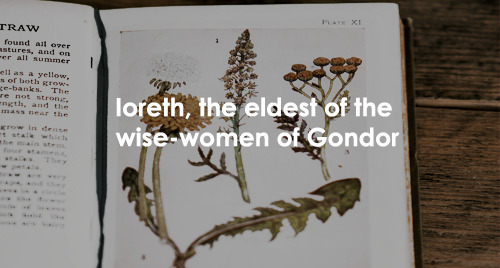



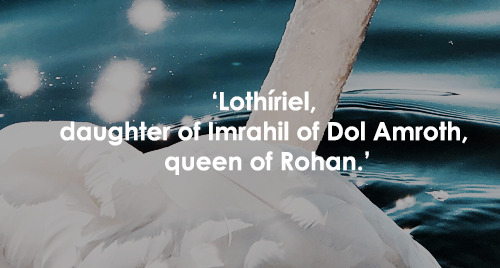

@lotrladiessource ➡ LOTR LADIES WEEK DAY TWO: WOMEN (part 1/2)
71 notes
·
View notes
Text

Ok but imagine if Elfhild was experiencing complications throughout her whole pregnancy, and Théoden, desperate to save his wife and their unborn child, decides to take her to his place of birth, Minas Tirith (because their healing expertise is far greater than anything in Rohan). But there was nothing that could be done, and Elfhild passes after birthing Théodred. Coincidentally at that same time the Steward's wife if also going through labour, and Finduilas ends up nursing both Boromir and Théodred together as if they were twins
#Is this anything?#I should also shoehorn Thorongil into this#Lotr#Théoden#Elfhild#theodred#Boromir#finduilas
12 notes
·
View notes
Text
His Name is Not REALLY Sauron, but no one really knows what to call him either
Tolkien's use of "Sauron" is infuriating. The character in question did not like that name because it meant "The Abhorred," or even "Foul-smelling and Vile." It was given to him by his enemies as an insulting play on his true name, which was Mairon, "The Admirable." However, Tolkien is an unreliable narrator at times and wrote from the perspective of a Noldorin/Numenorean/Gondorian scribe. Due to the implied bias in the text, the narrator uses every opportunity possible to get a pot shot in on Sauron Mairon.
This makes it very difficult to know when the character in question would refer to himself as Mairon, Sauron, or any one of his other many names and titles. Did he call himself Mairon in Angband? According to "Words, Phrases and Passages in Various Tongues in The Lord of the Rings", in Parma Eldalamberon XVII (edited by Christopher Gilson), the character used the name of Mairon until the fall of Numenor.
I guess the implication then would be that, since the character in question could no longer take a fair form, he decided to go full-on villain mode and accept the insulting title that his enemies gave him. After all, The Abhorred sounds more intimidating than The Admirable.
HOWEVER, Aragorn tells Legolas and Gimli that the "S" rune on the uruk helms belongs to Saruman, because the other "S" character does not permit his "right name" being written or spoken. (I guess this means that Aragorn considers "Sauron" to be the character's "right name" - not necessarily his "true name.")
To add to the confusion, there is also the existence of the Mouth of Sauron. In theory, this character might actually refer to himself as the Mouth of Mairon, but the Gondorian scribes, continuing their tradition of biased reporting, called him the Mouth of Sauron instead. Another possibility would be that the Mouth of Mairon refers to himself as the Mouth of Sauron when dealing with enemies, as the name would seem more intimidating.
This all makes for a very uncertain experience when writing about this character. Should he be called Mairon, when he isn't going by Annatar or Zigur? Or should the writer adapt the perspective of a Gondorian scribe, who would use the name Sauron at all times?
I don't know if there are any answers to these questions.
#sauron#mairon#annatar#zigur#aulendil#gorthaur#the necromancer#the nameless enemy#the great eye#base master of treachery#king of men and lord of middle-earth#elfhild's essays
14 notes
·
View notes
Text
462 notes
·
View notes
Note
For the five sentences ask game: 'Théoden would not have minded being dead but for the fact that he could not attend his niece's wedding in the flesh.'
The Halls of Men permitted those it housed to view the lives of those they had left behind, of course, but it was a poor substitute, looking at the misty threads of the Tapestry of the Living, when he had thought—in the days before Gríma began his leechcraft—that he would see his niece resplendent with joy on her wedding day and thus fulfill the promise he had made to his sister on her deathbed to see her children grown and settled.
But doom had set a different course for him.
Théodwyn’s hand, incorporeal as it was, settled on his shoulder with a warmth he had not thought possible in their current state, and she said, “Éowyn knows that you are with her, and that you hoped for nothing more than to see this day.” Compassion shone in her eyes, for she knew the sorrow he bore at having been able to fulfill only half of his promise to her.
Théoden reached up and placed his hand over his sister's, and with Éomund, Elfhild, and Théodred gathered about them, they watched as Éowyn, a vision of joy, took her husband’s hand and smiled as Théoden had seen her so rarely smile while he had still lived, and his heart stirred with a joy that he had not known since he had found his way to the halls of his fathers.
Five Sentences Game
14 notes
·
View notes
Note
So (I’m a fan) your Eowyn/Denethor parallels have me thinking – who on earth is Elfhelm? The books mention an “understanding” between he and Eowyn/Dernhelm and that has always fascinated me. Were they old friends? Lovers? Did Eowyn/Dernhelm command him? I know Tolkien is guilty of papering over gaps in his writing that fans work to fill but damn, this to me is one of the book’s great unsolved mysteries. He fascinates me. What’s your take?
Oh I have a very specific take on this, because Elfhelm is one of the older lords riding to the defense of Minas Tirith and is one of the Marshalls of the Rohirrim, the King's Lieutenant (not the First Marshall, since Grima ensures that no one holds that title by the War of the Ring, but functionally Elfhelm operates as First Marshall in that he orders the soldiers surrounding Edoras even if he does not have the authority to call a full muster) alongside Theodred and Eomer as second and third Marshalls. So he is a very important and powerful figure and personally trusted by Theoden. And yes he does appear to have some previous relationship with Eowyn doesn't he? I think that is because she's his niece, at least by adoption. Because Theoden's wife's name was Elfhild and, considering Rohir naming conventions (Theoden, Theodred, Eomer, Eowyn, siblings often sharing the same first particle etc) I would say Elfhelm was Elfhild's brother and so Theoden's brother in law, making him Theodred's uncle and likely very present in Eowyn's life since she was adopted by Theoden. Perhaps he was more supportive of her, perhaps he wished he'd been more able to defend her from Grima's obsession with her, perhaps after failing to save Theodred at the fords he wants to support his surviving family as much as he can? But at the very least, by this point, Elfhelm is happy to keep Eowyn's secret and allow her this last freedom of choice.
51 notes
·
View notes
Note
Here's an interesting fucked up 'what if' LotR scenario my brain came up with while I was trying to sleep last night. Something I figured you might find thought provoking as well.
Apologies for the long post, and I'll preface it all by saying I based this on the movies only - I've never read the actual books.
What if Grima Wormtongue wasn't just Theoden's counsellor, but also his illegitimate child?
It happened when Theoden was young - before he married Elfhild, and before Theodred was born. Grima was Theoden's firstborn.
He wanted to acknowledge Grima as his son, but couldn't, because this could have given Grima a claim to the throne, and his parents wanted his heir to be the child of his upcoming marriage to Elfhild, which was then being arranged. Queen Morwen made it clear that by-blow sons from lowborn country girls do not future kings make. Or, maybe Grima's mother was foreign-born (hence the dark hair) and the Rohirrim were a bit xenophobic and wanted a nice, blonde boy as their heir instead.
Theoden took care of Grima. He arranged for him to be educated, then brought him to court and gave him a good job with influence and authority - something appropriate for a King's son.
He never publicly acknowledged Grima, even in his later years, but everyone in Theoden's inner circle knew the truth.
This is why Grima became Theoden's right-hand man, and gained 'undue' influence over him. Everyone just looked at the setup and said 'well, that's the King's secret son, he's just helping his old man out, it's totally fine'.
Not helped by the fact that Theodred wasn't much interested in the business of running the kingdom, and preferred to spend his time hunting or chasing pretty girls (my headcanon), so Grima stepped into the gap that Theodred should have filled.
Saruman knew as well. He sought Grima out, whispered in his ear, persuaded him to act on feelings he'd previously kept to himself.
Grima sold out to Saruman because he resented his position, and his lack of recognition. As the eldest son, he thought he should be Theoden's heir. His parentage and birth status shouldn't matter.
This is why Grima 'assisted' Theodred's death in The Two Towers. Not just to weaken Rohan and further Saruman's plans - to get rid of the competition - the half brother who had everything he didn't.
It's also why Grima had his eye on Eowyn. Not just because she was young and beautiful - also because she was highborn and of the royal line, so a marriage to her would strengthen his claim to the throne. Think Henry VII of England marrying Elizabeth of York.
It's why Grima cried when he saw Saruman's army at Isengard - he realized he was about to be party to his own people's destruction. He's angry at being excluded, but not THAT angry.
Aragorn knew, because he was around when Theoden's thing with Grima's mother happened. It's why Aragorn stopped Theoden from killing Grima on the steps of Meduseld - fathers should never have to kill their sons, even when many would say doing so was justified.
Saruman's comment to Theoden at Isengard has two meanings now. Theoden's not the only man there who's the 'lesser son of a greater sire' - he means Grima as well.
It's why Theoden offered Grima mercy at Isengard, reminded him he was a man of Rohan, asked him to come back, instead of just writing him off. One last appeal from father to son.
It's why Grima attacked Saruman - one last moment of loyalty to his father and his King.
I freely admit this is all totally whack, but if it's okay to write a story where Aragorn meets Harry Potter, why not an AU like this?
I might actually try to write this one day, just for shits and giggles :)
So first, I love all of this and I am here for Bastard Son!Grima. He's out here to have conflicted emotions, a desire for a Family and Acceptance, hurt everyone around him, and to make some of the world's worst decisions.
Also, I feel like there's no need for things to be, idk, "believable" in fanfic re: premise. The whackier the premise the better - because then the characters have to react and it's a fun challenge to be like "so how would Theoden, as we know him, react in this situation wherein he's been betrayed by his son who he loves but also never really was able to demonstrate that to" etc.
and tbf we know literally nothing about Grima's background aside from his father's name - but that can be smudged/a reference to a grandfather/whatever (also Galmod means lust/desire so Grima being a by-blow resulting from Theoden's desire...) - so this is no more crazy than literally anyone else's theory on the matter.
Naturally I think you should write it! I would read the heck out of it.
<3 <3 <3
12 notes
·
View notes
Text
Going off the previous post of how important the spoken word is to the people of the Mark, it does merit a bit of discussion on the effects of languages used in the Royal House. Because there was a bit of contention!
So, people of the Mark speak Rohirric, but "the speech of Gondor" started to appear in the Royal house when Thengel King married Morwen Steelsheen, Éomer's grandmother. Morwen was Gondorian (and side note, it's through Morwen's line and her Dúnedain heritage that gives Éomer his height of 6'6"-- more about that here).
When Thengel married Morwen, there was some contention amongst the people of the language being used. It is said in Appendix A that Thengel "proved a good and wise king; though the speech of Gondor was used in his house, and not all men thought that good."
I want to take a bit to explain that contention, and it derives from the fact that the people of the Mark are orally based, and their word and language is the centerpiece of who they are. There are no written words about the people of the Mark, and when there is nothing of that kind, then the words they speak and the language they use become all the more important. And so, there's an arguable understanding as to why the people of the Mark may be less inclined to the thought of another language being used. If, say, Sindarin was historically used in the Royal House, and the vast majority of the people who live in the Mark do not understand it, then how can they trust the word of their King? How can they trust his honor?
Okay-- so then Thengel and Morwen have Elfhild, Théoden, and Théodwyn. Théodwyn is Éomer and Éowyn's mother, so you can see the way the Gondorian connection falls down the line.
Whether Éomer knows Sindarin is not specifically defined, though I would imagine he does understand the language to a certain extent. Certainly he uses Westron, or Common Speech, for others outside the Mark understand him, and only the people of the Mark speak Rohirric.
I don't believe he would default to the use of Sindarin, because Rohirric, to Éomer, is part of his identity and heart. Not speaking Rohirric would be akin to not accepting his culture and heritage. But he certainly is not ignorant of Sindarin. I think his background and family upbringing makes him less suspicious of the language than others may be.
Théodwyn may have used Sindarin in speaking with him, or in singing him songs when he was a child. When Éomer comes to the Royal House and is raised by Théoden, there could have been some Sindarin used there, as well. And then, when Éomer marries Lothíriel, there is yet another connection to the Sindarin language, and arguably a balancing of Rohirric and Sindarin used between them as they raise Elfwine, who is a child of two different cultures. And I do tend to think that Éomer likely spoke in Rohirric and Sindarin when exchanging marital vows to Lothíriel because he comes from an understanding of how important the spoken word is, and therefore wishes to honor her through the way she speaks.
3 notes
·
View notes
Photo


the lady maidens of rohan (from left to right)
elfhild, déorwyn, gerda, run, éowyn, gilraen, dernhild, guthwyn, walda
#ok now i'm happy#rpedits#c: guthwyn#tolkien oc#theroseis#been five years but just in case! lmao#the ORIGINAL HORSE GIRLS
2 notes
·
View notes
Text
Tar Palantir - Gimilkhad - Tar Miriel - Ar Pharazon
Amandil - Elendil - Isildur - Anarion
Aragorn - Arwen - Eldarion
Thorin - Gimli
Meriadoc Brandybuck - Estella Bolger - Boromir
Peregrin Took - Diamond of Long Cleeve - Faramir
Elanor - Frodo - Esmeralda - Merry - Pippin - Goldilocks - Hamfast - Daisy - Ruby - Marigold - Bilbo - Robin - Tolman
Daisy - Boromir
Ruby - Faramir
Denethor - Finduilas - Boromir - Faramir
Thengel - Morwen - Theoden - Theodwyn
Theoden - Elfhild - Theodred
Eomund - Theodwyn - Eomer - Eowyn
Eomer - Lothiriel - Elfwine
Faramir - Eowyn - Elboron
0 notes
Text
Did You Ask Me About Théodred’s Mom???
To the lovely anon who sent me an ask about Théodred’s mother—Tumblr randomly won’t let me post the incoming, but here is your answer regardless! All the below is my personal HC about Elfhild. (And it’s in my plans to write something about her soon-ish!)
Elfhild came from one of the most prominent families of the Westfold and was close kin to both Elfhelm and Grimbold. She was a great lover of lore and knew more of Rohan’s old songs and poems (those that documented their history and culture) than nearly anyone else. Because of the inherent link between history and music in Rohan, she was also an accomplished musician and a crafter of instruments. As an artisan, she was considered top tier, and she earned a fair amount of money in the instrument trade even though she didn’t really need to work because of her family’s wealth and prestige.
Thengel handpicked Elfhild to be Théoden’s wife, and it was really awkward for them at first because they hardly knew each other. As they spent time together, though, they built a great friendship and did come to love each other romantically. Théoden’s beloved youngest sister, Théodwyn, lived with them and, still being a child at the time, she looked up to Elfhild as a mother figure. Théodwyn particularly loved to sit on the terrace of Meduseld with Elfhild at night, where Elfhild would point out formations in the stars and make up little tales about the people and animals she saw there.
It took several years for Théodred to be conceived, and Elfhild was both ecstatic and relieved to find out she was pregnant. She spent happy months preparing for his arrival, and she composed him a bunch of songs and lullabies, including many based on the little constellation stories she had invented for Théodwyn. Late in her pregnancy, though, she began to have premonitions that it wouldn’t end well for her. She didn’t say anything about it to anyone, but she took some quiet steps to prepare, just in case. For example, she asked Elfhelm to move to Edoras so that her son would still be raised around someone from her family, and she taught Théodwyn all the songs and lullabies she had written so that Théodred could still hear them even if Elfhild herself couldn’t be the one to sing them.
She did, in fact, die in childbirth, and her death created a real crisis in Meduseld because Théoden did not handle it well. He retreated fully into grief, and because he couldn’t separate the birth of his son from the death of his wife, he had difficulty bonding with baby Théodred. As a result, Elfhelm and Théodwyn provided a lot of Théodred’s early love and care. Thengel died two years after Elfhild and had always urged Théoden to marry again so that Rohan would have a queen and Théodred a mother, but (as we know) he never did because he never fully got over Elfhild. Fortunately, though, Théoden did learn to put his grief in perspective and came to embrace Théodred and take over a more active role in his life. In gratitude to Elfhelm, Théoden put him in charge of Edoras’ forces (where we see him still at the start of LOTR—the functional First Marshal of the Mark whenever Théoden himself wasn’t around), and in gratitude to Théodwyn, he told her she could live with him for as long as she wanted (she stayed, keeping watch of Théodred, for another 10 years before she met Éomund and left to get married).
Théodred grew up with his mother very present in his life through the stories and memories shared by Théoden, Théodwyn and Elfhelm. When he was old enough, he got a tattoo on his chest of his favorite of the constellations from Elfhild’s songs/stories, and he frequently visited her grave just to talk to her and give her updates on his life. He remained extremely close to Théodwyn until her death and got his love of plants and gardening from her, and he learned riding and fighting at the knee of Elfhelm. When he came of age and was made a Marshal of the Mark, he made his base in the West-mark to be close to his mother’s people, including Grimbold, who became a top lieutenant. Grimbold and Elfhelm were both there when Théodred died and fought the forces of Isengard for possession of his body, which was then buried in the West-mark. They thought he would be happy to rest forever in his mother’s ancestral home.
Éomer is married to Elfhelm’s daughter (one of the very few canon non-compliant aspects of my HC), through which means the heir of Rohan still has some of Elfhild’s ancestry despite Elfhild and Théodred’s untimely deaths. All musical ability in the family was always attributed to her/Elfhelm’s genes.
#asks#answered asks#lotr#lord of the rings#theodred#théodred#elfhild#her son is one of my all time favorites#and so i love her too
11 notes
·
View notes
Text
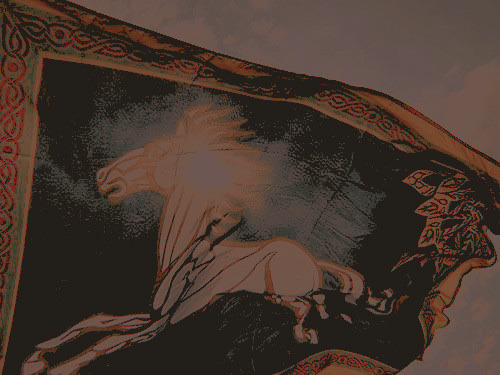

MUSE INTRODUCTION: idis / ælflæd
verse: lord of the rings / tolkien ( canon … somewhat )
parents: elfhild & théoden
culture: rohirrim
fc: marina ruy barbosa ( specifically her character in deus salve o rei )
an original portrayal of idis, a character from early lord of the rings drafts that was later discarded from the story by tolkien because he felt like she was overshadowed by éowyn. due to this, my portrayal will be mostly based on my own headcanons.
story below the cut.

idis is the firstborn and only daughter of king théoden and his wife elfhild. she was still a child when her mother elfhild died in childbirth, giving birth to her younger brother théodred.
despite being the firstborn, idis has always lived in the shadow of her brother, as he was the heir to the throne, and she has been fighting all her life to earn the same recognition from her father.
she grew closer to her cousins éowyn and éomer when théoden took them in, but idis’ relationship with her father became more strained after her brother’s death. while she was mourning, his shadow still loomed over her, even in death.
despite her resentment towards her father, idis has always chosen kindness towards everyone else. spending most of her time outside the city walls, she has been teaching herself to fight, practicing with her cousins she cared for as if they were her own siblings.
0 notes
Text
My most recent rabbithole of research tells me that in Tolkien's world, twins are significantly more common among Elves than Men. In fact there are only two known pairs of twins in the race of Men:
Haleth and Haldar, who crossed the Blue Mountains at the beginning of the first age.
Folcred and Fastred, brothers of King Fengel (and great-great-uncles to Eowyn, Eomer and Theodred
So naturally, I'm taking this information and creating a headcanon that Theodred had a stillborn twin sister. Because he's my Special Little Guy and I wanna give him more Special Little Guy points :)
(p.s - this sister would have been named Idis, as a nod to the daughter of Theoden who appeared in earlier drafts of LOTR)
(p.s.s- Elfhild died in childbirth, so in a way it kinda follows that the pregnancy would be more likely to have complications if it as a multiple one, right?)
@from-the-coffee-shop-in-edoras tagging you because i thought you might appreciate this thought :')
12 notes
·
View notes
Note
I was wondering if you had any more thoughts on the mouth of Sauron? The version where he did defect is interesting, what would make him do that? I know Tolkien started a story which involved Melkor/Sauron cults in Gondor after the war, but that idea makes more sense to me as something that would happen in Ecthelion’s and Denethor’s rule, a response to Sauron returning among those who expect him to win quickly and want to save themselves. Maybe he was involved in that before fleeing when they were banned and cracked down on? If he was from a prominent noble family I can imagine it being a major scandal, either if he was kidnapped or defected.
Thank you for asking this intriguing question!
I find all of Tolkien's possible backstories for the Mouth of Sauron to be quite fascinating. To answer your question, I have done a little research on Gondor during the reigns of Steward Ecthelion and Denethor. In 2951, two years before Ecthelion took the throne, Sauron declared himself openly, so dark forces were stirring in Middle-earth. I could not find any reference to internal conflict within Gondor at this time, but the possibility of Melkor/Sauron cults operating in secret is an intriguing one. If Tolkien entertained the idea of these cults arising in the days of peace after Sauron's defeat, it could be entirely possible that there were disloyal Gondorians who secretly served Sauron in the days of the Dark Lord's power.
This concept of Gondorian traitors in league with Sauron would fit in nicely with the second discarded backstory which Tolkien created for the Mouth of Sauron: "But it is said that he was a renegade, son of a house of wise and noble men in Gondor, who becoming enamoured of evil knowledge entered the service of the Dark Tower, and because of his cunning [and the fertile cruelty of his mind] [and servility] he grew ever higher in the Lord’s favour…" (“The Black Gate Opens,” The War of the Ring, p. 431)
In the published version of LOTR, Faramir says, "It is not said that evil arts were ever practiced in Gondor, or that the Nameless One was ever named in honour there […]" ("The Window on the West," The Two Towers, p. 286). However, he does go on to say that many among the Gondorian nobility yearned for immortality, as had the Numenoreans. "Kings made tombs more splendid than houses of the living […]," and "[…] in secret chambers withered men compounded strong elixirs, or in high cold towers asked questions of the stars." To me, this implies that some of the Gondorian kings and nobles were dabbling in alchemy, sorcery, and other forms of magic in an attempt to evade old age and death.
One of the major themes in Tolkien's writing is that it is VERY BAD to attempt to halt change, and a desire to do so leaves one vulnerable to the schemes of Sauron. While Faramir implies that Gondor's flirtation with elaborate tombs and preservation magic diminished with the rule of the kings, perhaps that was not truly the case.
If there was an element of internal corruption within Gondor, the return of Sauron to Mordor in 2951 would definitely have stirred the murky waters. When Faramir says that evil arts were never practiced in Gondor, he was comparing Gondor to Numenor. While Numenor descended into evil and wicked deeds, Gondor remained upon the path of light. However, individuals do not always represent their country, and there may have been a dark malignancy buried deep under the surface.
If one entertains the possibility that the Mouth of Sauron was a renegade Gondorian nobleman in league with the Dark Lord, perhaps his true loyalties were discovered and he was forced to flee Gondor. Logically, this would indeed cause quite a scandal! However, it's possible that his defection was covered up so as to avoid bringing shame to his family, or to discourage others from switching allegiances. It's also possible that the Gondorians practice damnatio memoriae - the removal of the name of a disgraced person from all official records. The ancient Egyptians practiced this custom, and Tolkien compares Numenor and Gondor to ancient Egypt on several occasions. Over the years, fans have theorized that this is why there is no record of the names of the three Numenorean lords who became Nazgul.
5 notes
·
View notes